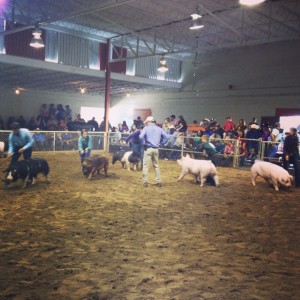**This article is not a substitute for the advice of an attorney.**
The United States Court of Appeals for the Eighth Circuit decided a case today involving a ban enacted to prevent a 4-H member from showing pigs in South Dakota after allegations of cheating.
A 15-year old 4-H member showed a belted barrow to 4-H Show Reserve Grand Champion and FFA Show Grand Champion honors at the 2011 South Dakota State Fair. Shortly after her wins, allegations began to fly that the pig did not belong to the 4-H member and, instead, was a different belted pig that had been shown at another State Fair. The abusive allegations became so severe that the 4-H member deleted her Facebook page and her parents sought help in stopping the abuse from the county extension office.
Shortly thereafter, the South Dakota State University Extension Service held a meeting and issued a letter to the 4-H member barring her from showing livestock at 4-H shows because she “misrepresented ownership” of her barrow. The 4-H member received no notice of the meeting or opportunity to present evidence in her defense before being banned and was denied the opportunity to appeal this decision. Her father, on her behalf, filed suit against the South Dakota Extension Service (“SDES”) and related state officials. The lawsuit sought a preliminary injunction to prevent the 4-H member from being barred from showing because her constitutional right to due process was violated. The Court sided with the 4-H member and issued the injunction, which prohibited the ban from being enforced against the 4-H member.
The Defendants appealed the decision and sought a stay of the injunction, essentially requesting that the ban remain in place until the lawsuit was finished. The 4-H member argued that if she were not allowed to compete in the 2012 show season, she would be damaged. The court agreed with the 4-H member and denied the stay. She was allowed to show during 2012. Today, the Eighth Circuit affirmed this decision. Importantly, although the Eighth Circuit found that the 4-H member will likely be successful on the merits of her Due Process claim, it did not, in fact, rule on the merits at this stage.
In order for a Due Process claim to exist, there must be a protected interest in life, property or liberty at stake. The Eighth Circuit Court of Appeals found that the 4-H member is likely to succeed in proving that her participation in the state-sponsored 4-H organization and livestock competitions is a right or status protected under the Due Process Clause. “The record clearly demonstrates that the ban deprived [the 4-H member] of the opportunity to participate in a public program that was important to her education and career development and from which she had obtained significant personal income.” In reaching this decision, the Court reasoned that participation in 4-H activities is more similar to participation in college athletics (for which due process rights apply) than high school interscholastic or extracurricular school activities (to which rights do not apply) because of the potential economic rewards. “4-H participation, unlike most high school athletics, is a career-oriented program.”
Because the Court found that that the 4-H member was likely to succeed in proving that 4-H activities is a constitutionally protected interest, the requirements of the Due Process Clause would be applicable. Here, the Court reasoned, the 4-H member was afforded no process at all. She was not informed punishment was being considered, she had no opportunity to be heard, she was given no right to appeal.
The Court also found that the 4-H member suffered irreparable harm that entitled her to the injunction. Specifically, the Court noted that the ban would have caused the 4-H member to suffer “loss of educational and professional opportunities” and “reputational injury” based upon the SDES ban.
Thus, the Court found in favor of the 4-H member and affirmed the injunction that prevents the ban from being enforced against her. The case will now continue at the trial court level for a merits decision on whether her Due Process Rights were violated. [Read full opinion here.]












